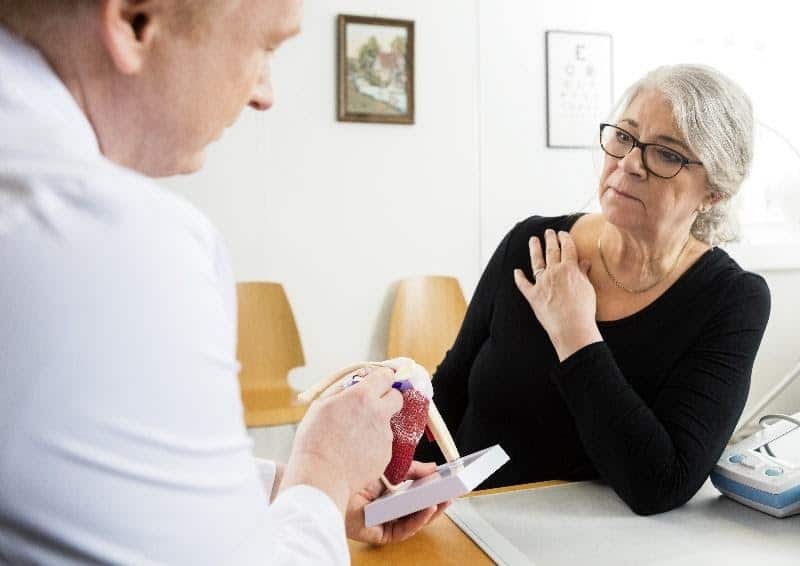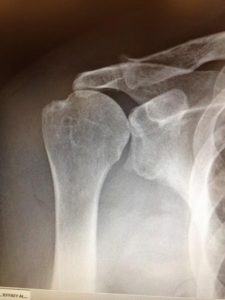Shoulder Cuff Tear Arthropathy Treatment in Chillicothe, OH Treatment
Shoulder cuff tear arthropathy or rotator cuff tear arthropathy is a degenerative process that occurs over time where a chronic retracted rotator cuff tear results in an unstable “center of rotation” of the shoulder joint. This results in proximal migration of the humerus with relation to the socket, and can be associated with breakdown of the cartilage surfaces of both the humeral head and the glenoid socket.

Anatomy of the Rotator Cuff
The rotator cuff is a group of muscles and tendons in the shoulder that provide support and enable mobility. The rotator cuff muscles begin at the scapula or shoulder blade and are connected to the head of the humerus, which is the upper arm bone. The muscles and their tendons form a “cuff” around the ball-and-socket joint.
The four muscles of the rotator cuff are the subscapularis, supraspinatus, infraspinatus and teres minor. These muscles help stabilize the shoulder joint and allow a shoulder to move smoothly. When a rotator cuff is torn, a tendon is no longer fully attached to the humerus and the shoulder joint’s stability and range of movement is affected.
Why Choose Dr. Cohen?
OVER 20 YEARS EXPERIENCE
One of the first orthopedic surgeons employed by a large hospital. Dr. Cohen spent 20 years.
TRUSTED BY OVER 100,000+ PATIENTS WORLDWIDE
Over his distinguished career, Dr. Cohen has cultivated a reputation of excellence and trust among his patients and his peers.
UTILIZING THE LATEST TECHNOLOGY
To achieve the best surgical outcomes, Dr. Cohen utilizes the most advanced technologies and techniques, keeping his practice state of the art.
PATIENT SAFETY IS TOP PRIORITY
An individualized, patient-focused process coupled with decades of training and experience help ensure maximum safety for all of Dr. Cohen’s patients.
Diagnosing Shoulder Cuff Tear Arthropathy
To diagnosis rotator cuff tear arthropathy, Dr. Cohen or one of his sports medicine colleagues will obtain a complete “history of present illness” from you and conduct a focused, comprehensive physical exam to evaluate your shoulder for areas of tenderness, assess range of motion and establish whether you have normal or decreased arm strength. Depending on the findings, they may order an X-ray, perform an ultrasound and/or order an MRI.
Rotator Cuff Tear Arthropathy Causes and Risk Factors
Rotator cuff tear arthropathy develops over time. Patients might have a rotator cuff tear for years without knowing it. Over time, the chronic rotator cuff tear leads to an unstable shoulder joint, which leads to proximal humeral migration and potentially the development of shoulder arthritis.
Shoulder cuff tear arthropathy occurs most often in individuals over the age of 65 and is more common in women than in men. It is more common in the dominant shoulder.
People are at a higher risk for shoulder cuff tear arthropathy if they have a rotator cuff tear, rheumatoid arthritis, crystalline-induced arthropathy or a hemorrhagic shoulder.
Shoulder Cuff Tear Arthropathy Symptoms
The most common symptoms of shoulder cuff tear arthropathy include:
- Shoulder pain
- Weakness of the shoulder joint
- Swelling around the shoulder
- Loss of mobility
- Atrophy of the muscles around the shoulder joint
Symptoms of shoulder cuff arthropathy can be mild or severe.
Treatment Options
Nonsurgical Treatment
 In some cases, shoulder cuff tear arthropathy can be treated nonsurgically through physical therapy, aquatherapy, non-steroidal anti-inflammatory medications and cortisone injections. In more severe cases, surgery may be recommended.
In some cases, shoulder cuff tear arthropathy can be treated nonsurgically through physical therapy, aquatherapy, non-steroidal anti-inflammatory medications and cortisone injections. In more severe cases, surgery may be recommended.
Surgery is considered when the patient has not responded to non-surgical measures, quality of life is significantly impaired, the patient is healthy enough to undergo the surgery and the patient understands and accepts the risks involved.
There are a few different surgical options available to patients suffering from shoulder cuff tear arthropathy: rotator cuff debridement with lysis of adhesions, partial shoulder replacement and reverse total shoulder replacement.
Surgical Treatment Options
Surgery is considered when the patient has not responded to non-surgical measures, quality of life is significantly impaired, the patient is healthy enough to undergo the surgery and the patient understands and accepts the risks involved.
There are a few different surgical options available to patients suffering from shoulder cuff tear arthropathy: rotator cuff debridement with lysis of adhesions, partial shoulder replacement and reverse total shoulder replacement.
Schedule Your Orthopedic Consultation
If you would like to learn more about your shoulder cuff tear arthropathy treatment options, schedule a personal consultation with orthopedic surgeon Dr. Brian Cohen. Dr. Cohen is a well-trained surgeon who has treated over 100,000 patients worldwide and offers a customized approach to your orthopedic care. He has extensive experience with shoulder cuff tear arthropathy. Call or email his office today.






